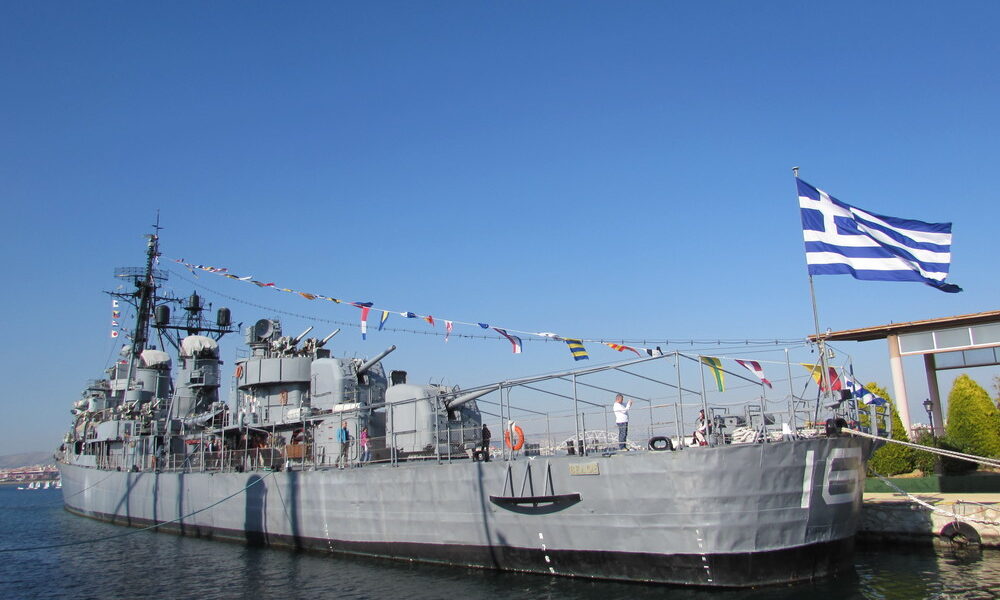The historic Hellenic Navy vessel "Velos", a Niki-class destroyer that now operates as a museum, sustained damage during the strong storm that struck Greece's second city of Thessaloniki on Tuesday.
According to the ministry of shipping and island policy, an estimate of the extent of the damage is expected by Wednesday afternoon.
The ship was anchored at Nea Paralia, where it was buffeted by violent northwesterly winds that managed to break the lines holding the fenders in place, leaving it to crash against the dock unprotected.
The ship was then held in place by two tug boats that were sent out to prevent further damage.
The Velos, originally named USS Charrette (DD-581), was a Fletcher-class destroyer of the United States Navy, named for Lieutenant George Charrette (1867–1938), who was awarded the Medal of Honor for heroism during the Spanish–American War.
Entering service during World War II, she spent her career in the Pacific theatre. Placed in reserve following the war, Charette was transferred to the Kingdom of Greece in 1959 and renamed Velos (D16), remaining in service till 1991 before being preserved as a museum.
In 1994 the Hellenic Navy General Staff declared her a Museum of the Struggle against the Dictatorship (Greek: Μουσείο Αντιδικτατορικού Αγώνα).
The ship, then anchored at Poros Naval Base, was transferred on 14 December 2000 to Salamis Naval Base for maintenance and restoration work in order to be converted into a visitable naval museum.
From 26 June 2002 until 9 September 2019 she was anchored in the Naval Tradition Park at Palaio Faliro, Athens. Since 9 September 2019, Velos has been anchored on the waterfront of Thessaloniki, close to the city's Concert Hall and is available to visit. Velos is regarded as still in commission
On 25 May 1973, Velos, under the command of Nikolaos Pappas, while participating in a NATO exercise and in order to protest against the dictatorship in Greece, anchored at Fiumicino, Italy, and refused to return to Greece.
When in patrol with other NATO vessels between Italy and Sardinia (85 nautical miles (157 km) southwest of Rome) at midday on 25 May 1973 the captain and the officers had learned by radio that naval officers had been arrested and tortured in Greece.
Commander Pappas was in a group of democratic officers who were loyal to their oath to obey the Constitution and planned to act against the junta. Pappas knew the arrested officers opposed the junta and realised there was no further hope for a movement inside Greece.
He decided to act alone to motivate global public opinion.
Pappas mustered the crew on the stern and announced his decision, which was received with enthusiasm.
Pappas signalled his intentions to the commander of the squadron and NATO Headquarters, quoting the preamble of the North Atlantic Treaty (founding treaty for NATO) which declares that "all governments ... are determined to safeguard the freedom, common heritage and civilization of their peoples, founded on the principles of democracy, individual liberty and the rule of law".
Leaving formation, he sailed for Rome.
That afternoon, he anchored about 3.5 nautical miles (6.5 km) off the coast at Fiumicino and three officers (Ensigns K. Gortzis, K. Matarangas, G. Stratos) went ashore in a whaleboat.
From Fiumicino Airport they telephoned the international press agencies to inform them of the situation in Greece and the presence of the destroyer. They arranged for a press conference to be held the next day by Commander Pappas. This action sparked international interest in the situation in Greece.
The captain, six officers and twenty-five petty officers requested asylum and remained in Italy as political refugees.
Initially, the entire crew wished to follow their captain (170 men signed a request), but they were advised (and some ordered) by their officers to remain on board because of the fear of retaliation by the regime against their families.
The men were told to return to Greece and to inform their families and friends about what had happened.
Velos returned to Greece a month later with a replacement crew. After the fall of the junta on (24 July 1974), some of the officers returned to the navy. Commander Pappas reached the rank of Vice admiral and served as the chief of the Hellenic Navy General Staff from 1982 to 1986.
READ MORE: Three more Pakistanis wanted by Greek police for terror plot on Jewish restaurant in Athens.


